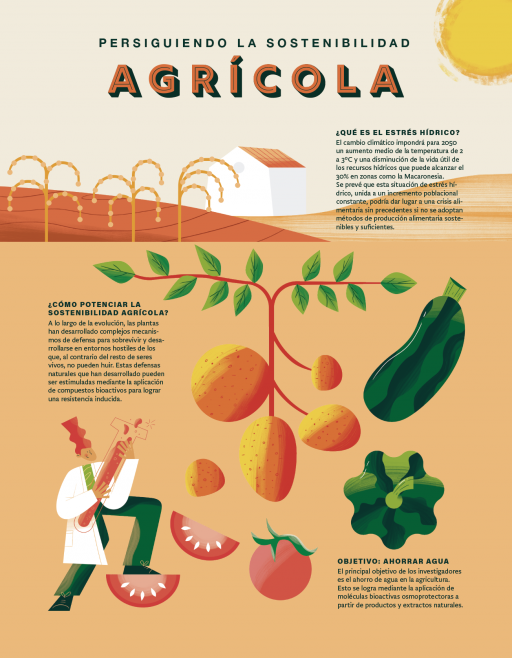Pursuing agricultural sustainability in Macaronesia
The IPNA seeks to develop technology to save irrigation water and thus avoid the impact of climate change on agriculture.
In 2050 the planet will probably be populated by nine billion people but this immense population growth will not be matched by sufficient food production to sustain them all. In coming years, the world's population will face an unprecedented food crisis exacerbated by a a range of adverse weather events caused by climate change. Sustainable production is key to achieving a world free from hunger by 2030. The Canary Islands must contribute to this goal by finding a way to avoid the impacts of global warming on its crops.
Climate change will impose an average temperature increase of 2 to 3º Celsius by 2050, leading to a decrease in water resources and their recycled lifespan, likely reaching 30 % in Macaronesia, which includes the Canary Islands. These changes will have an enormous impact on agriculture, leading to loss in productive capacity of agricultural crops and huge economic losses.
These scenarios pose an enormous challenge for the Macaronesian regions. Being the most affected, they must also prepare themselves properly before reaching the point of no return. Macaronesia is committed to developing and implementing actions that promote the adaptation of agriculture and the main regional crops to new climatic conditions and scenarios. We must guarantee economic activity, the maintenance of productive potential and food security.
Plants will be the most affected, as they are sessile organisms, i.e. they do not have the ability to flee from a hostile environment as animals do. To survive, they have had to develop complex defence mechanisms over the course of evolution, but climate change will come so fast that it will be impossible for many of them to mobilize this natural protection.
However, it can be induced, and this is what a group of researchers from the Institute of Natural Products and Agrobiology (IPNA-CSIC), led by Andrés Borges, are working on. They have found that, through the application of often simple harmless molecules, it is possible to stimulate their natural defences, known as induced resistance or tolerance.
"The main objective of our AHIDRAGO research project is to save water in agriculture by developing a technology based on the application of bioactive osmoprotective molecules, derived from natural products and extracts", explains Borges. This type of development will make it possible to protect the crops of greatest economic and strategic interest in Macaronesia from water deficit and excess salinity conditions. The project arises as a result of common interests and collaboration between several research groups and public institutions. Together, they are looking for a substance with these characteristics and also for plant varieties that are more resistant to water stress.


